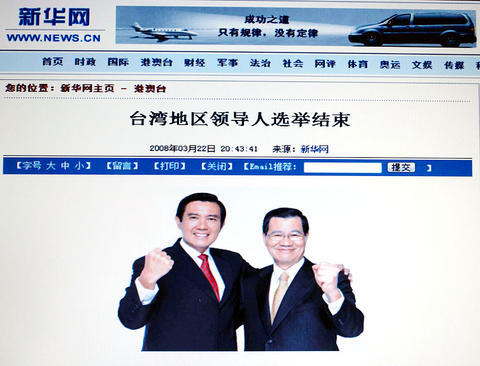The failed passage of both UN referendums in Saturday's election may have sent a message to the world that Taiwanese do not care about the country's admission to the UN, a group of foreign and local academics said yesterday during a roundtable in Taipei.
Calling the failed referendum a "miserable story," Gunter Shubert, from University of Tuebingen's Institute of Chinese and Korean Studies, said that not only was the collective will of Taiwanese falsely represented, but the referendum, as a political instrument, was "misused and degraded" in this election, as both camps used it to boost the interests of the party rather than to mirror what the people wanted.
Both referendums were also poorly formulated, he said.

PHOTO: CNA
The referendums proposed by the Democratic Progressive Party (DPP) and the Chinese Nationalist Party (KMT) on Taiwan's UN bid were held in tandem with the presidential election on Saturday.
The DPP called on voters to agree on Taiwan applying for a full UN membership under the name "Taiwan," while the KMT version asked for support for Taiwan to re-enter the body as the "Republic of China," or under any other "practical" titles.
The referendums failed as the 35 percent turnout fell short of the required threshold of more than 50 percent of eligible voters, even though the DPP proposal received a 94 percent "yes" vote and the KMT proposal was approved by 87 percent.
Aside from specialists and those who followed the matter closely, most people will likely equate the low turnout with lack of desire for membership in the global body, Shubert said.
If Taiwan continues to misuse referendums, he said, people will eventually start to lose faith in the tool.
Christopher Hughes, professor of international relations at the London School of Economics, said the Beijing government could spin the results and argue that the referendum defeat showed that most Taiwanese do not wish to be independent from China.
Shortly after the result was announced on Saturday night, Beijing's Taiwan Affairs Office released a statement saying the failed referendum meant that "the issue of independence has not won the heart of the Taiwanese people."
Asked if he believes Taiwan can recover from the setback, Hughes said: "The situation cannot be worse than it is right now," adding that Taiwan should develop better public relations strategies to win more support.
Lin Cheng-yi (
"If it had been the UN that conducted the referendum on Taiwan's membership, the result would have been overwhelmingly different," he said.
At a separate forum hosted by the Taiwan Foundation for Democracy yesterday, political observers said newly elected president Ma Ying-jeou (馬英九) needs to think hard about how he will explain the failure of the referendums to the rest of the world.
Lee Yeau-tarn (
"What is even more regrettable is that the result was interpreted in such a way that would make it appear that the referendums were voted down, which is not the case," Lee said.
Highlighting the problem of the threshold, Lee said, is the fact that "the legislature would have been an illegitimate institution if the 50 percent turnout was an appropriate threshold."
"A 35 percent turnout isn't that bad," Lee said, adding that in 2005, the turnout at the National Assembly on approving a constitutional reform package that determined a legislative reform proposal was 23 percent.

Taiwanese can file complaints with the Tourism Administration to report travel agencies if their activities caused termination of a person’s citizenship, Mainland Affairs Council Minister Chiu Chui-cheng (邱垂正) said yesterday, after a podcaster highlighted a case in which a person’s citizenship was canceled for receiving a single-use Chinese passport to enter Russia. The council is aware of incidents in which people who signed up through Chinese travel agencies for tours of Russia were told they could obtain Russian visas and fast-track border clearance, Chiu told reporters on the sidelines of an event in Taipei. However, the travel agencies actually applied

New measures aimed at making Taiwan more attractive to foreign professionals came into effect this month, the National Development Council said yesterday. Among the changes, international students at Taiwanese universities would be able to work in Taiwan without a work permit in the two years after they graduate, explainer materials provided by the council said. In addition, foreign nationals who graduated from one of the world’s top 200 universities within the past five years can also apply for a two-year open work permit. Previously, those graduates would have needed to apply for a work permit using point-based criteria or have a Taiwanese company

The Shilin District Prosecutors’ Office yesterday indicted two Taiwanese and issued a wanted notice for Pete Liu (劉作虎), founder of Shenzhen-based smartphone manufacturer OnePlus Technology Co (萬普拉斯科技), for allegedly contravening the Act Governing Relations Between the People of the Taiwan Area and the Mainland Area (臺灣地區與大陸地區人民關係條例) by poaching 70 engineers in Taiwan. Liu allegedly traveled to Taiwan at the end of 2014 and met with a Taiwanese man surnamed Lin (林) to discuss establishing a mobile software research and development (R&D) team in Taiwan, prosecutors said. Without approval from the government, Lin, following Liu’s instructions, recruited more than 70 software

Taiwanese singer Jay Chou (周杰倫) plans to take to the courts of the Australian Open for the first time as a competitor in the high-stakes 1 Point Slam. The Australian Open yesterday afternoon announced the news on its official Instagram account, welcoming Chou — who celebrates his 47th birthday on Sunday — to the star-studded lineup of the tournament’s signature warm-up event. “From being the King of Mandarin Pop filling stadiums with his music to being Kato from The Green Hornet and now shifting focus to being a dedicated tennis player — welcome @jaychou to the 1 Point Slam and #AusOpen,” the